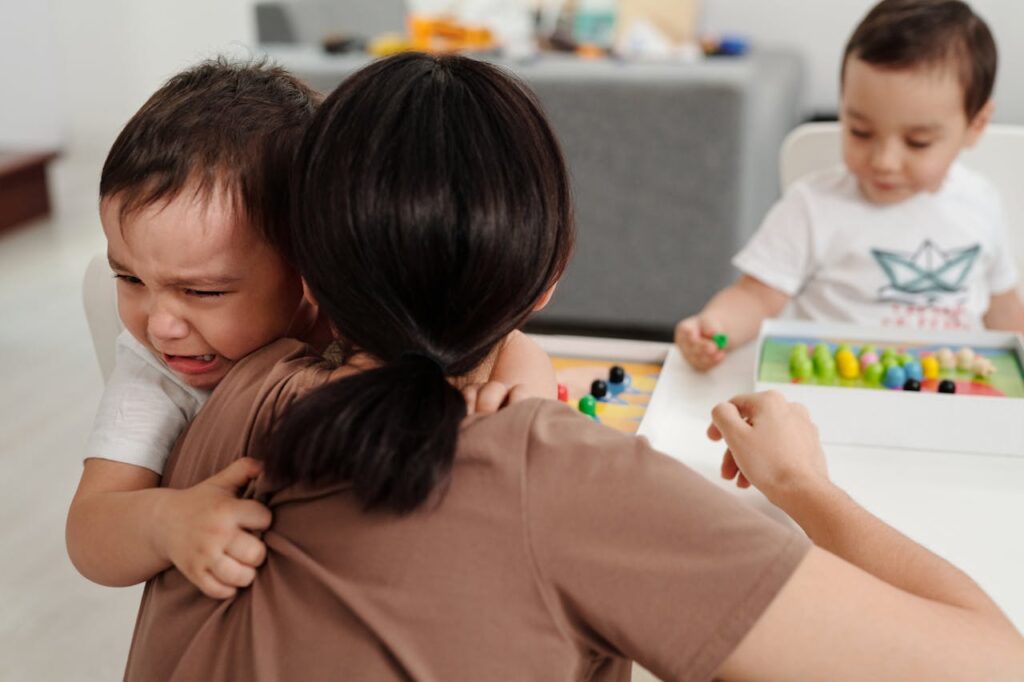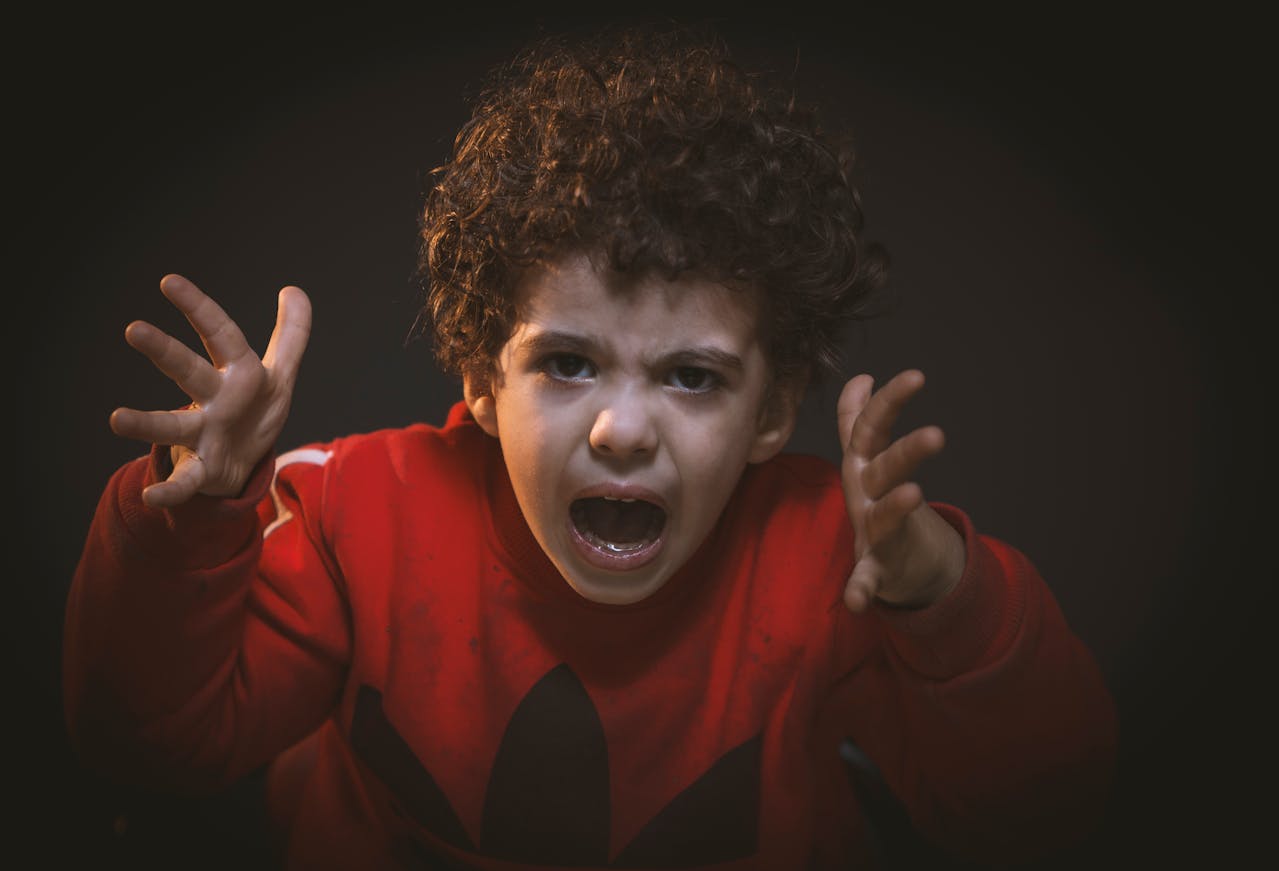Kids love to yell. It’s a simple fact that toddlers and young children will shriek and scream their way through early childhood. Sometimes, it’s joyful and cute – at a distance. Other times, it’s a full-blown meltdown at exactly the wrong moment. Those are the times when it’s hard to handle. Many parents find themselves exhausted and exasperated after yet another shrieking tantrum. Fortunately, we can assure you that all that yelling is perfectly normal and there are proven parenting methods to help you get through this very loud phase.
Why do kids scream? There are a lot of possible reasons, from distress to joy to cries for attention. Understanding why your child is screaming will help you navigate each individual situation while guiding your child toward self-regulation and quieter self-expression. Children’s screaming is something you can master with a few insightful parenting tips.
Understanding the Reasons Behind Children’s Screaming
Why do kids scream so much? Every scream has a reason. There are many different reasons why children scream, but you can usually figure out the source. Younger children scream when they are overwhelmed with emotion, even over things that seem small to an adult. Children scream when having a tantrum, when attention-seeking, or trying to get their way. But often, it is simply because they don’t know what else to do in response to their situation.
Screaming is the most primal response to big feelings, whether those feelings are discomfort, frustration, loneliness, or even overwhelming want. Children also scream when they are happy, and in the right situations (like the park) it can even be encouraged.
Learning the reason behind why your child’s behavior is the best way to address screaming and teach them a better way.

Credit: Pexels
1. Developmental Milestones and Expression
Screaming is a natural part of child development. Babies cry and scream so their needs are met, and toddlers try this until it doesn’t work anymore. Why do kids scream so much as toddlers? Toddlers and young children also scream when their words fail them, as a default form of communication when overwhelmed.
Developmental milestones make a big difference when it comes to reducing incidents of screaming. Language acquisition allows your little one to express their needs and desires without resorting to screaming. Emotional development makes it possible to process big emotions more effectively. But even older kids sometimes get overwhelmed and start using volume to express themselves.
Toddlers
- Maintain infant screaming until other methods work better to meet their needs and solve discomfort when something bothers them.
- Scream in response to BIG emotions until they learn the words necessary to express themselves.
- Scream for attention because it works.
- Get overwhelmed and need to “scream it out” until the storm passes.
Young Children
- May resort to screaming when upset until they start to develop emotional regulation.
- Can learn (with guidance) to identify and talk about emotions before they get overwhelmed.
- Can learn to get upset with their inside voice.
- Yell and scream to get their own way until it stops working.
Teens
- Are experiencing new BIG emotions that sometimes lead to raised voices.
- Can get so frustrated that they scream and tantrum all over again.
- Must learn adult-level emotional regulation techniques for adult-sized feelings.
2. Emotional Expression and Needs
Remember that screaming is your child’s first way to ask for help, long before they learn their first word. From this perspective, it’s easy to see why children default to screaming to express their emotions and needs. Asking why do kids scream so much can help you find the answer when you pay attention.
Frustration, hunger, or pain are all reasons a child might scream to get your help. Children also scream when their emotions are too big to contain. Anger and excitement are both reasons that toddlers and young children might express strong emotions through high volumes.
This is why it’s important to validate your child’s emotions before you try to modulate their behavior. Discover and acknowledge why your child is upset. This not only shows that you care, it also gives your child the words they’ll need to better express themselves or ask for help in the future.
- “I know you’re frustrated, and it’s OK to be upset.”
- “I can see how angry you are because you want to keep playing.”
- “I know you’re upset because you wanted to pet that doggy.”
- “I can see how much you care about Mister Fluff, but he’ll be right here when you come back.”
- “I know you really want a cookie right now. Sometimes, we have to wait for good things.”
3. Environmental Factors and Triggers
Parents can also learn to identify situations that trigger screaming, just like you did when your child was a baby. Why do babies scream, if not to request food, comfort, love, and saving from discomfort. Parents rarely ask, “Why do kids scream so much?” when talking about infants.
Young children are still prone to screaming when they are tired, hungry, or overstimulated and those feelings seem bigger than they can handle. They might not yet know how to talk about their needs, or forget how to use words when they get to upset.
Your best strategy is to identify the trigger, offer solutions, and maintain a calm, supportive environment. You can teach your child how to handle these situations by modeling the right language, attitude, and self-regulating techniques to get through tough and uncomfortable situations.
Relate, Explain, and Offer Solutions
Help your child answer the question “Why do kids scream so much?” for themselves. Show your child you know why they are upset, use words to explain their feelings to them, and then outline what to do next. This will model coping mechanisms for your child while also validating how they feel in the middle of their melt-down.
- “I know you’re tired and want to go home. Once we finish checking out, we can go home and have a nap.”
- “Ouch, scraped knees can really hurt. It’s OK to cry while I get it fixed up.”
- “You’re hungry because you missed snack time today. We can have a snack together when you calm down.”
Model Calm and Emotional Regulation
Show your child what it looks like to self-calm. A screaming toddler in a public place can be pretty upsetting. You might want to do your own screaming or crying at that moment. Use this as inspiration to show your child how to guide themselves out of a tantrum.
- Close your eyes and take a deep breath.
- Sit on the ground with your child and breathe deeply together.
- Hold your child while they cry and reassure them that it’s OK.
- Introduce the Loud-Quiet game: “That was really loud! Who can whisper the best?”.
Talk About Pre-Emptive Solutions
When your child is calm, talk to them about how they felt, why they felt that way, and how you can solve that kind of problem before it becomes the next meltdown. Between tantrums is the right time to implement positive parenting and teach problem-solving.
- If your child is prone to fatigue, teach them to say “I’m tired” before they get overwhelmed.
- If they get “hangry”, teach them the importance of snacktime and how to anticipate the next meal.

Credit: Pexels
Common Questions About Children’s Screaming
Some children get into a screaming phase. Some go through “extinction tantrums,” where they scream more before the screaming stops. When you’re asking yourself, “Why do kids scream so much?” remember that young kids need time to learn other forms of expression when they are upset, overwhelmed, or even when they are really happy. The most important thing is to take care of your own physical and mental health so you have the energy to handle each screaming incident with calm, patience, and problem-solving.
How Do You Stop a Child From Screaming?
The best way to stop children from screaming depends on why they are screaming. Are you wondering how to stop toddler from screaming? The answer may vary from helping older kids with their emotions. With a problem-solving approach, you can reduce screaming episodes, pre-empt screaming before a tantrum is triggered, and teach your children alternative ways to express themselves. These parenting tips can help you deal with a meltdown and guide your child toward more productive behaviors.
- Active Listening – Listen, empathize, and explain your child’s emotions to them. Help them feel heard so they stop screaming for your attention and help. Comfort your child and help them understand it’s OK to be upset without screaming. You can also use deep breaths and model calming behaviors after the emotion is acknowledged.
- Physical Needs – Reducing distress and teaching your child to explain what they need can reduce needs-based screaming. For example “My sock is itchy” is a problem that can be solved more quickly without screaming if your child knows how to express their distress. Before they can talk it out, a little parental sleuthing can sometimes stop a screaming fit.
- Teach Inside Voice – Why do kids scream so much without realizing? Sometimes, children don’t notice how loud they are being. Practice different volume levels (at home) and identify when different loudnesses are appropriate. Teach “Inside Voice” vs “Outside Voice” vs “Grandma/Church Voice” and “Don’t Wake the Baby Voice” and so on. You can use these familiar terms later to help your child choose the right volume.
- Independence – Applying the principles of self-determination can help you encourage a combination of autonomy, competance, and relatedness so that your child feels more confident expressing their emotions with words and actions instead of screaming. Providing emotion words and responding to requests when asked calmly are great ways to encourage your child to learn self-expression and self-determination.
- Planned Ignoring – You may find yourself wondering why do kids scream so much just to get their way? If an older child is screaming to change your mind or get unnecessary attention, wait until they can ask in an inside voice before responding. It’s important to first identify the difference between emotional or needs-based yelling and screaming to get their way. Being consistent is key to teaching older kids that screaming won’t work to get their way anymore.
- Offer Choices – Kids sometimes yell when they are frustrated for lack of control. Offering choices can be an effective method for how to stop a toddler from screaming. It can help a child feel in control of the situation, redirect their attention, and motivate them toward good behavior.
Why Do Kids Scream When Having Fun?
As a parent, it’s also important to embrace the idea of positive screaming. Why do kids scream so much outdoors? Because they are overwhelmed with happiness and excitement. Children often shriek with joy when they are playing, excited, and experiencing a positive sensory overload. Joyful screaming can even be encouraged in the right situations.
2-year-olds to preschoolers have a hard time identifying when they are being loud. You can use redirection to manage positive excitement. As children approach school age, they can also learn to select their “Indoor Voice” when asked.
What Causes Excessive Screaming in Children?
Why do kids scream so much more than other kids? Excessive screaming is when a child screams often, for prolonged periods, is inconsolable, or with self-harming behaviors. There are several possible causes for excessive screaming.
- It Worked in the Past – The most common cause for frequent screaming (that may quiet quickly) is a method the child uses to shape their environment. If parents regularly or unpredictably give in to screaming, the child will keep trying it until the method doesn’t work anymore.
- Extinction Tantrums – When a child is learning that screaming doesn’t work, they may go through one final round of excessive screaming and tempter tantrums before it stops. This is part of the “behavior extinction” pattern that is normal in parenting.
- Sensory Processing Issues – A child may scream more often, longer, or without solutions if they have sensory processing issues that cause them greater distress than seems logical in a situation.
- Delayed Development – Children who learn language or emotional regulation late may also scream more than other children their age.
If normal extinction and positive parenting methods don’t work or you suspect your child has sensory or development issues, see your pediatrician.

Credit: Pexels
Conclusion
Why do kids scream so much? Children scream for many different reasons. Some get overwhelmed easily. Some have very strong opinions and scream when they are frustrated. Some throw tantrums, some cry for attention, and they will often scream with happiness when playing. Parents who learn how to tell the difference can help their child learn how to avoid screaming incidents on their own, and make it through when things get overwhelming.
It’s important to understand and address the underlying reason for each screaming fit and why kids scream so much. You can use a balanced approach of the many techniques we have explored to better understand your child and manage screaming episodes when they happen. Children’s screaming can be a temporary and healthy phase as long as they are learning emotional regulation and problem-solving skills along the way.
In conclusion, understanding why children scream involves recognizing their developmental needs, emotional expression, and environmental triggers. By applying strategies rooted in self-determination theory, such as fostering autonomy and providing a supportive environment, parents can effectively reduce the frequency and intensity of their child’s screams. Remember, each child is unique, and patience combined with understanding goes a long way in navigating this common aspect of parenting.
Ready to tackle those challenging parenting moments? Join our online parenting classes, led by certified All About Parenting experts, and get the support you need! Sign up today to make parenting easier and more joyful.







